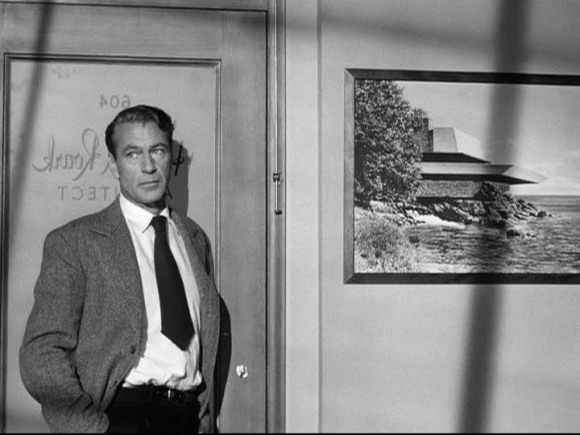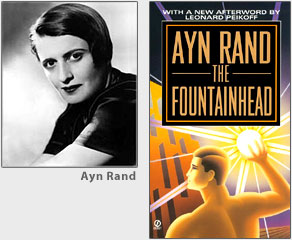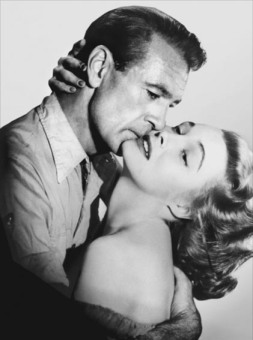“To sell your soul is the easiest thing in the world. That’s what everybody does every hour of his life. If I asked you to keep your soul – would you understand why that’s much harder?”
Not only is it okay to be different and to be an individual, but it is also a human need as necessary as breath – that’s the way it should be.
The plot is a marvelous fabric in the hands of Ayn Rand, in which she entwines her views and unique philosophy – the Objectivism. Her philosophy is stimulated by a deep admiration for the human kind. The fate of a person is to be happy. He achieves happiness by self-fulfillment, in creating and using his mind. Each person is an individual, each person is free, each person is talented, each person is valuable and each person chooses to direct his lifestyle to self-fulfillment or self loss.
Happiness lies within the person himself and in his productivity. There is no need to control other people or to serve other people in order to be happy. Logical analysis of reality allows the happiness to flourish in a person who lives for himself and not for others. If one follows that designation and maintains nobility of morals he is an admirable being. On the other hand, If he betrays himself in order to please others, and does not create anything, he deteriorates into a despicable, disgraceful human waste.
Almost unconsciously you compare between mediocrity and Howard Roark, a sublime, ideal representative of our species that throughout his life has remained true to himself. Howard Roark is a man as a man was born to be – a superior creature. He is driven solely by his desire for self-realization. Intelligent, independent, talented, sturdy in body and especially in spirit, he has his own opinion and the guts to stand by it, he is not affected by anyone, he doesn’t settle for anything less than exactly what he wants, he is his own master and does not take orders from anybody. Even when the situation seems lost and hopeless, he never backs down or hesitates. Even when it gets extremely tough, he doesn’t betray himself. He seems too good to be true. More like an overwhelming notion than a real person.
Rand tells the story of the various types of the human kind and interconnects them during the plot. The history of the characters gives a substantial depth and greater understanding of the main message of the novel.
Dominique Francon is Roark. Well, a female version of him. In a way, you can say that Roark fell in love with himself.
Peter Keating, Roark’s college friend, is a typical example of the mediocre. He is clay in the claws of the society that sculpts him to its norms. Weak-willed, spineless, servile, affected by the rest of the people and incapable of at least one single independent thought. He sells himself, his loved ones, the people around him. He’s jealous of Roark, and hates him on an instinctive level, without realizing why. Roark has never done anything wrong to Keating, on the contrary. Keating is so pathetic, he doesn’t even realize Roark’s superiority as a personality.
Ellsworth Toohey, petty journalist, is a person deprived of acceptance in society since his childhood, due to his sickly appearance and ill health. Society gave him no chance and turned him into a bad-to-the-core monster. A recipe for a ruthless dictator. Cunning, gifted in rhetorics and analyzing the human soul, he has enough brains to perceive the superiority of Roark and that he could never be like him. That’s why he hates Roark so much.
Gail Wynand, publisher of The Banner, complex and tragic. He is human with great faults and misdeeds. He is aware of the superiority of Roark and he admires and praises it. He is also aware of the fact that the same superiority could have manifested itself in him as well, had he the sufficient resilience to the pressure of society. He is an example of a potential superhuman, but one who betrayed himself and became another tool of society.
Man is a social being. He lives among humans and needs human contact and company. The most lone wolf still needs other people. But society naturally strives for uniformity, to homogenize all the individuals composing it, like it’s a key to its survival. When there’s someone that does not match the characteristics of society, an exception, a stranger who does not belong, he is scary, he is rejected and he becomes an outcast. This is what happened to Howard Roark, the only one brave and strong enough to stand alone against all the others. This constant pursuit of total equality limits the progress of the whole species. Every time there was a brilliant person in history, he was suffering, he was persecuted, he was an outcast, he was a victim on the altar of sacred and sanctimonious equality. There may never be complete true equality, because every person is an individual and not a robot on an assembly line. Instead of nurturing the uniqueness in each person, the intellect and talent of every individual, from birth he is forced into a prototype fitting the norms of society. Consequently, being lowered into an equal mediocrity and even lower and more dangerous places than that. This is Rand’s novel, in the love of the human individual, you and me.



